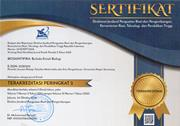The Interaction between Marasmius pulcheripes J8 and Soil Fungi on Laccase Activity for POME Degradation
(1) Department of Microbiology, Research Centre of Biology, Indonesian Institute of Sciences
(2) Department of Microbiology, Research Centre of Biology, Indonesian Institute of Sciences
Abstract
A study on the effect of Marasmius pulcheripes J8 and soil fungi interaction on the activity and ability of laccase to degrade palm oil mill effluent (POME) was previously conducted, and some Basidiomycetes fungi were identified capable. Therefore, the aim of this study was to determine the ability of Marasmius pulcheripes J8 to degrade POME in the presence of inducers, and interactions with soil fungi. Furthermore, 3 types of inducers were applied to elevate its laccase activity, which include CuSO4, sucrose and Ammonium tartrate. In addition, M. pulcheripes J8 was grown together with soil fungi, encompassing Aspergilus niger NK and Penicillium sp R 75, in order to boost the action. The results showed the highest laccase activity was in M. pulcheripes J8 pure culture on a PDB medium of 3566.04 U / mL. Moreover, the POME decolorization was up to 74.25% after 20 days of incubation, and reduced COD level was 81%. Meanwhile, the addition of an inducer has never been performed before, and the outcome of this investigation showed the ability of M. pulcheripes J8 to degrade POME, and decrease environmental pollution. POME waste treatment using fungi is more affordable than other methods.
Keywords
Full Text:
PDFRefbacks
- There are currently no refbacks.

This work is licensed under a Creative Commons Attribution 4.0 International License.


